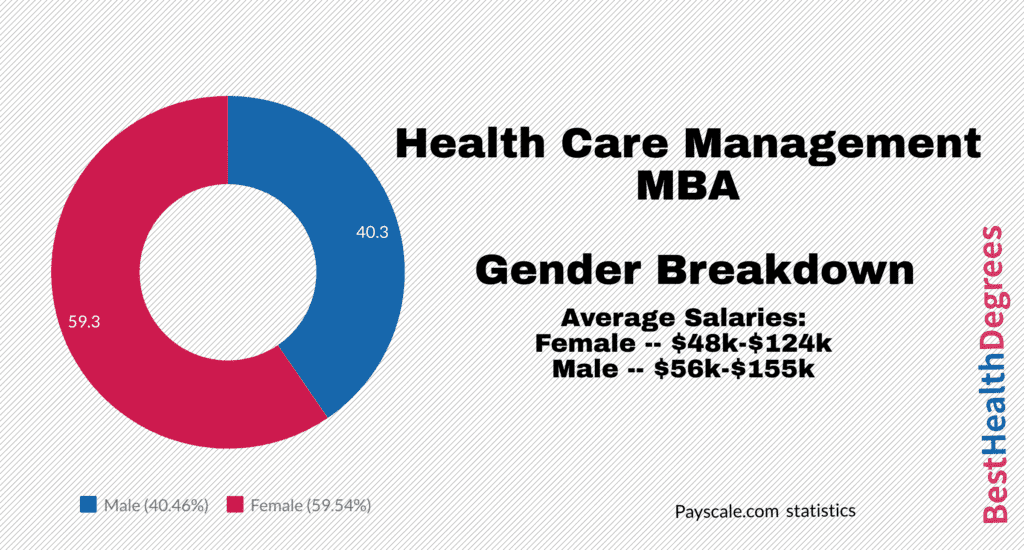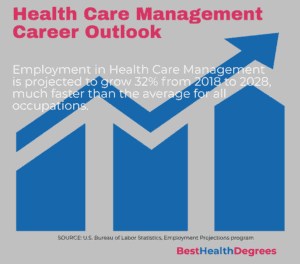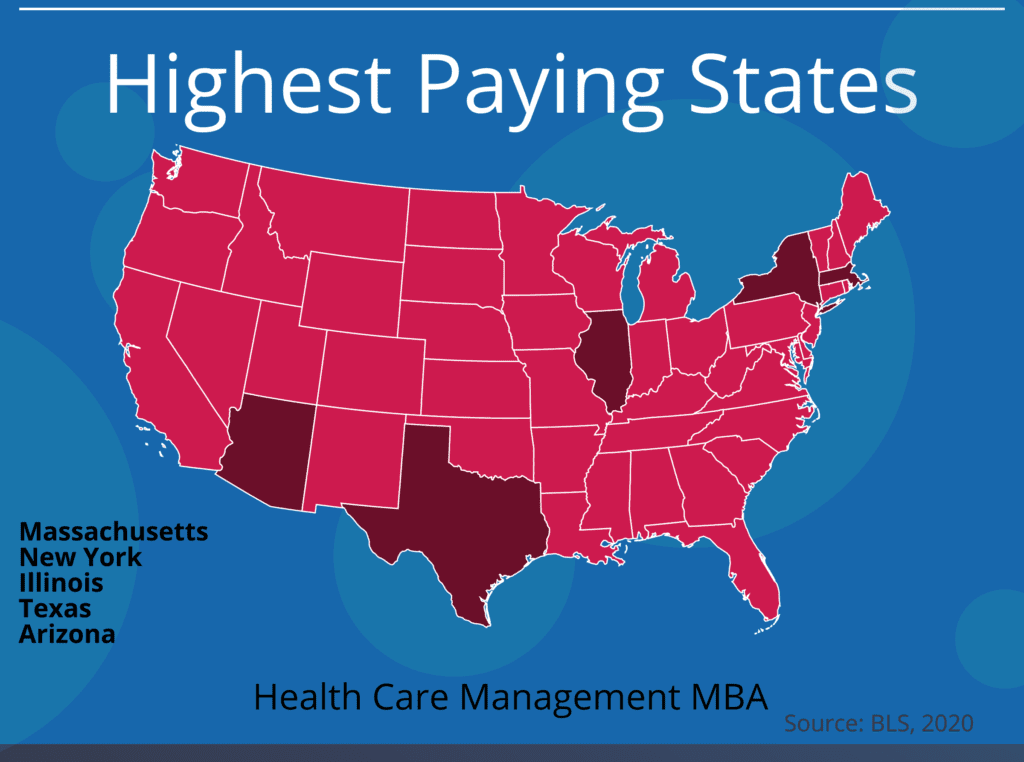Key Takeaways:
- A Healthcare MBA prepares you for high-level management jobs in healthcare settings like hospitals and clinics.
- MBA in Healthcare Management explores topics such as health policy, technology, and healthcare finance.
- Earning an MBA with a healthcare focus can lead to roles such as hospital administrator or health services manager.
- MBA healthcare jobs are among the highest-paid in the healthcare sector.
Have you been considering applying to school to earn a Master of Business Administration with a healthcare concentration, as a means to further your career in the healthcare business as a healthcare professional?

Have you also wondered what the difference is between an MHA vs MBA degree – a Master of Health Administration vs. a Master of Business Administration? These are legitimate and important questions.
As you continue to consider your options for a graduate degree in healthcare, remember to find the answers to these inquiries –
- What are the fundamental differences between an MHA vs an MBA degree?
- Is it possible to earn an MBA and MHA dual degree simultaneously?
- How does an MHA vs MBA salary compare?
- Are there online schools that offer an MBA MHA dual degree program?
The narrative that follows answers these questions (and many more). It concludes with an assessment of the differences between an MHA vs an MBA salary.
Accreditation For Healthcare Administration MBA Programs
The process of accreditation attempts to standardize quality and consistency in the academic arena. Accreditation agencies are responsible for assessing both schools and the individual degree programs offered by schools and universities. From a holistic perspective, the process of accreditation has been developed to
- Develop consistency in the academic quality of the country’s education systems.
- Protect the public by higher learning institutions accountable for the programs they offer & advertise.
The criteria used to discern if a school or program meets accreditation standards depend upon the level of accreditation and industry boards that govern that particular industry. The United States maintains two primary accreditation levels.
Regional Accreditation
Regional accreditation is the oldest of the accreditation processes used today in the academic community. It supports the creation and maintenance of quality education in the nation by evaluating the curriculum, educators’ credentials, and, therefore, the credibility of these degrees. The U.S. Department of Education organizes the country into six regional agencies, which are noted below.
- The Higher Learning Commission (HLC)
- WASC Senior College & University Commission (WSCUC)
- New England Commission on Higher Education (NECHE)
- Northwest Commission on Colleges & Universities (NWCCU)
- Middle States Commission of Higher Education (MSCHE)
- Southern Association of Colleges & Schools Commission on Colleges (SACSCOC)
Each of these regional accreditation agencies manages the schools and related programs in its defined region.
In addition to regional accreditation, schools can voluntarily open their programs and schools for inspection by accreditation agencies sanctioned by the government and industry leaders. This is known as specialized accreditation.
Specialized Accreditation
The process of specialized accreditation is typically the responsibility of professional agencies with the authorization to perform such services. As you continue to analyze the best healthcare management MBA programs that are within reach (and budget!), it is essential to look for those accredited MBA programs with healthcare administration concentration options.
MBA degree programs are generally overseen and accredited by professional organizations dedicated to supporting the field of business. The best MBA programs for healthcare management majors will likely have been awarded accreditation by these organizations –
- The ACBSP – representing the Accreditation Council for Business Schools and Programs – this organization was founded in the late 1980s and holds the distinction of being the first accreditation agency to accredit each academic level of business education.
- The IACBE – representing the International Accreditation Council for Business Education. – the organization is officially recognized by CHEA for the accreditation of education relations to business management and accounting. Once known as the Assembly for Collegiate Business Education, the IACBE has awarded accreditation to more than 1,750 institutions of higher education across the globe.
- The AACSB – representing the Association for the Advancement of Collegiate Schools of Business – this accrediting body is widely accepted to be the finest in accreditation for business education programs, with an objective to great the next generation of the healthcare industry’s leaders. The AACSB, which was founded more than a century ago, operates on an international basis and has offices in Florida, Singapore, and Amsterdam with more than 1,500 members and more than 750 accredited schools worldwide.
An MBA MHA dual degree program may also have received accreditation from the CAHME. Some choose only an affordable online MHA.
The CAHME – the Comm. on Accreditation of Health AND Management Education
As the accreditation benchmark for the healthcare industry, the CAHME membership represents a cross-section of the healthcare industry and includes –
- Health care clinicians
- Health care managers/administrators
- Health care educators, among others
Note, too, that CAHME is the ONLY accreditation organization that has been sanctioned by the Council on Higher Education Accreditation) for health care management education.

Types Of Healthcare Management MBA Degrees
If you are truly thinking about a career in healthcare management – typically considered an academic degree that is a major intersection between the fields of healthcare and business – an MBA degree is one of the fastest educational paths you can choose. Fortunately, there are many healthcare administration MBA online programs from which to choose, should you need or prefer to attend classes through a distance learning platform. In fact, some of the best online MBA healthcare management programs are only a click away.
An MBA in healthcare administration online program provides degree candidates with a comprehensive education program that prepares graduates for a variety of fulfilling career opportunities. Online MBA in healthcare administration degree candidates are typically vying to work on the administrative side of the medical field.
Most healthcare administration MBA online students choose to enter this MBA in healthcare administration online program with a few years of professional experience when applying. Some of the benefits of earning an online MBA in healthcare administration include the student’s exploration of healthcare topics like –
- Health Policy
- Relevant Technology
- Healthcare finance, accounting, economics
- Healthcare leadership skills & refined critical thinking
- Business Planning
- Problem-solving skills
- Risk management
- Project management
- Legal compliance
- Human Resources & Capital Management, to name a few
Students enrolled in an accredited MBA in healthcare administration online program will graduate with these important healthcare administration and management skills –
- Develop and implement pragmatic solutions to improve the delivery of healthcare through technology and innovation.
- Be able to make ethical decisions based on evidence-based techniques.
- Communicate effectively.
- Analytically evaluate problems to clarify potential solutions to healthcare delivery issues.
- Be able to balance and appropriately prioritize tasks that compete for priority.
Healthcare Management MBA Jobs
If you are considering earning an MBA with a health care concentration, it is critical to understand the potential and available MBA healthcare jobs before committing to a school or program. Be sure to find the answers to these questions –
- What kind of entry level MBA healthcare management jobs are available in my location?
- Would my budget allow me to attend an MBA program that would allow me to look for MBA healthcare management entry level jobs in another part of the country?
Essentially MBA in healthcare management jobs fall into four broad categories, as follows –
- MBA Jobs in Healthcare Management for those who wish to work in the provision of medical services.
- MBA Healthcare Management jobs for those who wish to work in the provision of pharmaceuticals and other medical equipment.
- MBA Jobs in Healthcare Management for those who wish to work for health insurance companies.
- Healthcare Management MBA jobs for those who wish to work managing and operating healthcare facilities (healthcare administrators).
There are a variety of in-demand careers available to those who earn their healthcare administration MBA online degree. Some of the careers available to those who hold an MBA in healthcare administration include top level executive positions in many health care facilities and organizations that include –
- Hospitals.
- Rehab Facilities.
- Nursing homes.
- Clinics.
- Psychiatric Centers.
- Medical facilities
- Pharmaceutical Corporations, among many others.
Highest Paid Healthcare Management Jobs
| Careers | Salaries | |
| Chief Financial Officer (CFO) | $196,000 | |
| Chief Executive Officer (CEO) | $176,550 | |
| Chief Operating Officer (COO) | $188,000 | |
| Chief Information Officer (CIO) | $177,000 | |
| Health Care Consultant | $150,000 | |
| Health Care Administrator | $98,350 | |
| Medical and Health Services Manager | $99,730 |
Popular MBA In Healthcare Management Jobs
Healthcare managerial jobs and careers are considered among the highest paid, and the most rewarding within the healthcare industry.

Health Services Managers & Administrators
Health service administrators and hospital administration are one of the most popular jobs with an MBA in healthcare management degree. These MBA in healthcare management jobs require MBA graduates to plan and coordinate the managerial functions for any number of medical and healthcare organizations. Health service managers offer a unique and savvy combination of business acumen, project management skills, and healthcare trends – with the objective to ensure healthier lifestyles by promoting healthier lifestyles and preventing disease, where possible.
Additionally, those who hold MBA healthcare management jobs are tasked with the responsibility of ensuring their facility maintains compliance with the relevant regulatory oversight rules. Many entry level MBA healthcare management jobs in the health services realm begin as an assistant to existing health service administrators.
Pharmaceutical Project Managers
Other available popular jobs in the healthcare system with an MBA in healthcare management degree include project managers who work for pharmaceutical companies. These MBA healthcare management jobs oversee new product/drug developments, including marketing and management of therapy trials.
Pharmaceutical project managers begin as trainees when hired for MBA healthcare management entry level jobs. They work closely with scientists (chemists, biochemical engineers, etc.), technicians, doctors, and marketing professionals.
Hospital Administrators
One of the most popular MBA in health care management jobs is that of a hospital administrator. Hospital administrators are tasked with the responsibility of the managerial functions required to operate a clinic, hospital, research/medical center, or nursing home, among others. Hospital administrators are responsible for–
- The hiring of staff – doctors, nurses, and support staff.
- Designing and implementing medical innovations and procedures.
- The medical facility’s public relations platform and policies.
- Developing and meeting annual budgets.
- Compliance issues regarding HIPAA and the management of sensitive, private personal information, to name a few.
Policy Analysts or Researchers
Many MBA graduates find MBA jobs in healthcare management working in the area of research or policy analysis. Policy analysis is one of the healthcare management MBA jobs that provides an opportunity for you to become involved in the development of new programs or new policies to improve health care treatments and delivery, where available.
Healthcare policy analysts compile and assess relevant data from numerous sources to determine if current programs are effective and to determine how to improve those health service programs that are underperforming. Policy analysts with an MBA in healthcare management typically work for government agencies, political action committees, non-profit organizations, community organizations, and multi-national corporations, among others.
Medical Entrepreneurs
The field of medical technology has been and continues to be one of the most lucrative fields and one of the fastest-growing facets of the medical industry. Jobs with an MBA in healthcare management are wonderful opportunities for entrepreneurs who want to champion a medical tech company or lead an academic program in the discovery of new or improved medicines. Medical biologics offer amazing results to those afflicted and even bigger returns for those companies who successfully develop and bring these new products to market.
Entrepreneurship in the medical industry has been recognized to have contributed to the development and research of many medical maladies, like improving a cancer patient’s survival rate or helping slow the development of dementia or Alzheimer’s disease, among many others.
The next section offers some insight into the MBA in healthcare management job outlook.
Salary For Healthcare Administration Professionals
The federal government’s BLS (Bureau of Labor Statistics) classifies MBA healthcare management salaries across several categories. According to the BLS, there were more than 420,000 health service and medical managers employed in the U.S, with a median annual salary of $100,980.

It is important to note that the BLS foresees the job growth for health service and medical managers (i.e., MBA in healthcare management jobs salary) to be 32% through the year 2029 – nearly eight times as fast as the average of all job growth rates combined.
To help with your analysis, consider these top paying states for these MBA in healthcare management jobs salary options –
| The top Paying States | Salary of MBA in Healthcare Management |
| District of Columbia | $150,040 per year (2019) |
| New York | $147,000 per year (2019) |
| Hawaii | $133,320 per year (2019) |
| California | $133,040 per year (2019) |
| Massachusetts | $132,960 per year (2019) |
To help with your analysis, consider these top paying metro areas for these MBA healthcare management jobs salary options –
| The top Paying Metro Areas | Healthcare Management MBA Salary |
| Santa Cruz, CA | $163,280 per year (2019) |
| Vallejo-Fairfield, CA | $159,190 per year (2019) |
| Bridgeport – Stamford, CT | $154,570 per year (2019) |
| Salinas, CA | $154,440 per year (2019) |
| Hanford – Corcoran, CA | $145,340 per year (2019) |
Additionally, consider these top paying metro areas for these MBA healthcare management salary options –
| The top Paying Non-Metro Areas | Healthcare Management MBA Salary |
| New Hampshire Non-metro | $144,920 per year (2019) |
| Mother Lode, Eastern Sierra, CA | $135,720 per year (2019) |
| Non Metro Upstate-Central, NY | $127,960 per year (2019) |
| Northern Upstate NY | $125,850 per year (2019) |
| Western North Dakota | $123,900 per year (2019) |
Other job categories that would reveal MBA healthcare management salaries,
| Top Paying – MBA in HM Options | Salary for MBA in Healthcare Management |
| Administrative Services Managers | $96,940 per year (2019) |
| Financial Managers | $129,890 per year (2019) |
| Top Executives | $104,690 per year (2019) |
| Information Systems Managers | $146,360 per year (2019) |
| Human Resource Managers | $116,720 per year (2019) |
Professional Organizations In Healthcare Management
Healthcare professional associations bring together professionals from a common industry (or even just one facet of an industry) working towards the organization’s primary objectives. Professional organizations dedicated to healthcare managers and administrators act as champions for its members by providing members with networking opportunities, mentorships, education and training workshops, and job boards, to name a few.
The health care industry is forever changing. This is one of the primary reasons that it is beneficial to join a professional organization – to stay abreast of topical and technical issues and legal revisions that impact compliance requirements. The health care industry offers several relevant professional organizations to support healthcare management professionals.
Each professional organization noted-below offers members specific services and benefits. The ways in which these professional organizations differ generally have to do with the angle/approach/slice of the industry in which they have chosen to support. These professional organizations are recognized as industry leaders and offer valuable resources and help for students and other healthcare industry professionals.
The American College of Healthcare Executives (ACHE)
The ACHE – the American College of Healthcare Executives is organized into seventy-five chapters across the country, with a membership that exceeds 40,000 healthcare professionals. The ACHE’s mission is to support healthcare executives as a partner by offering resources to help mitigate the expense of healthcare and to make it more accessible to everyone.
ACHE members choose to make a professional commitment that includes a dedication to lifelong learning. This includes maintaining educational commitments in terms of leadership, inclusion, & diversity. The regional chapters that define the American College of Healthcare Executives offer members –
- Volunteer opportunities that act as networking opportunities and experiential learning moments.
- Educational programs and services in support of new technologies, laws, and research.
- Job boards & career advancement services, to name a few.
The dues to join the American College of Healthcare Executives are $160 for each year for a two-year member commitment. The dues become $265 over the next three years. At year five, membership fees in ACHE will increase to $345 annually.
The NAHAM – the National Association of Healthcare Access Management (NAHAM)
Based in Washington, the National Association of Healthcare Access Management is a healthcare industry professional organization designed to ensure the industry seeks to reach the highest standards. The NAHAM accomplishes its goal by –
- Promoting the best medical practices in the industry and its members.
- Establishing subject matter experts to work among healthcare professionals across the industry and the world.
The National Association of Healthcare Access Management offers members great benefits that include the following –
- Health Care Industry networking parties, meetings & workshops.
- Educational coursework to meet industry licensing requirements.
- Health Care credential and certification options.
Active memberships in the National Association of Healthcare Access Management fits best for healthcare managers. The yearly fee for membership in the National Association of Healthcare Access Management is $102.50. The organization offers an associate membership at $65 per year. This limited membership is best for those healthcare professionals who are non-managers.
The Healthcare Financial Management Association (HFMA)
The HFMA – the Healthcare Financial Management Association, is another health care professional organization with a membership that exceeds 50,000. The FHMA is on a mission to help its members meet their medical agency’s/facility’s financial performance expectations by providing innovative solutions, subject matter experts, and financial/tax attorneys when needed. The Healthcare Financial Management Association offers educational opportunities and certifications for health care professionals involved in the financial management of health care or medical centers. These benefits include –
- • Conference and workshops at the local and the national level.
- • Relevant and topical health care seminars available online or in-person.
- • E-learning opportunities to help support members’ career objectives, among others.
The Healthcare Financial Management Association offers students a discount with a $50 annual membership fee. The Healthcare Financial Management Association is offered to new members a variety of options based on their place in the organization level. These membership options run between $175 to $495, contingent on the membership level chosen.
The AAHAM – the American Assoc. of Healthcare Administrative Mgt.
Established in the 1960s, the American Association of Healthcare Administrative Management was originally known as the American Guild of Patient Account Management. In the last half of a century, the AAHAM has evolved into one of the most prominent health care managerial, professional organizations in the industry. Its mission is to offer health care managers a comprehensive set of relevant resources regarding –
- Professional networking opportunities through meetings and workshops.
- Certifications by offering coursework & computerized exams.
- Advocacy, support, and mentorship in health care managerial functions.
- Education and coursework designed to meet the needs of health care managers charges with the responsibility of managing the revenue of a medical facility.
If you are enrolled in school as a full-time student (defined as a minimum course load equal to 12 credit units), you are entitled to join AAHAM at no cost – although membership is limited and does not provide for voting rights.
An AAHAM national membership runs $209 each year. However, if you join mid-year, the membership fee for the year will be prorated accordingly.
Related Rankings: